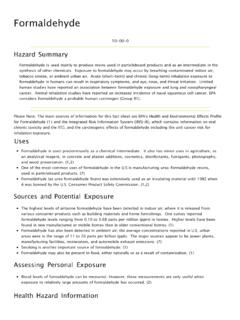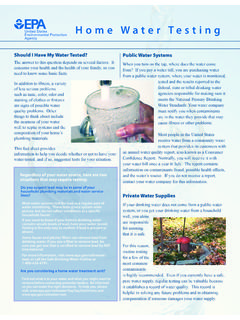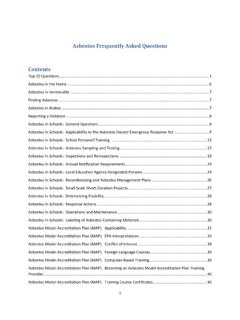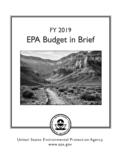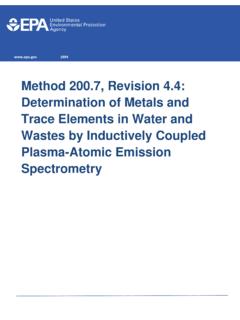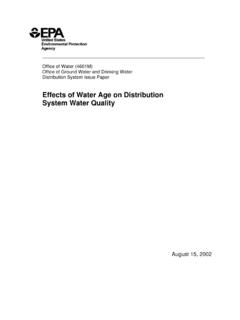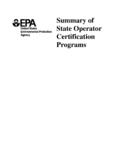Transcription of A SELECTION OF TRAINING PROGRAMS - US EPA
1 SORT BY PROGRAMELEMENTS A SELECTION OF TRAINING PROGRAMS FOR WATER AND WASTEWATEROPERATORS SORTBY SPONSOR OR MAJOR CONTRIBUTOR DEPARTMENT OF LABOR/WORKFORCE INVESTMENTAGENCYUTILITYSTATE OR PROVINCEUNIVERSITY/COMMUNITYCOLLEGEHIGH SCHOOLUTILITY ASSOCIATIONSANDOTHER ORGANIZATIONS INTERNSHIPAPPRENTICESHIPMENTORINGFOR NEW OPERATORSFOR EXPERIENCED OPERATORSFOR MAINTENANCE/OTHER WORKERSOVERVIEW This is a compilation of fact sheets describing TRAINING PROGRAMS , internships and mentoring PROGRAMS that help new operators enter the water and wastewater industries, as well as enhance the skills and knowledge of experienced operators.
2 The fact sheets are intended to promote the sharing of unique ideas and best practices for industry professionals seeking to establish similar TRAINING PROGRAMS . The fact sheets represent the experiences of states, utilities, educational institutions and other organizations that sponsored and developed these PROGRAMS . Program sponsors found these PROGRAMS to have many benefits, including: Creation of highly-qualified and highly-trained technical and professional staff; Development of leadership and supervisory skills innew and current staff; Effective way to build a pool of new recruits; Promotion of succession planning and knowledge transfer; Exposing new audiences to water sector careers.
3 EPA would like to acknowledge the members of the Workforce / Operator Certification Workgroup for their efforts in developing these fact sheets. Office of Water (4606M) April 2013 PROGRAM TYPE: U . S . DEPARTMENT OF LA B O R JOB CORPS ENTRY-LEVEL WATER AND WA S T E W A T E R OPERATOR TRAINING ALASKA JOB CORPS WATER AND WASTEWATER OPERATOR TRAINING SPONSORING UTILITY RESPONSIBILITIES: INFORMATION FOR PROGRAM DEVELOPMENT: Sponsoring utilities must agree to serve as a mentor to the students, spending 6 to 12 months to show and train them on relevant work processes as identified in the TRAINING Achievement Records.
4 * (See next page for more information.) Utilities are not required to invest financially in the student. Partnering with Alaska Department of Environmental Conservation (ADEC) is critical to ensuring that the program curriculum will assist students in passing state certification exams. PROGRAM DESCRIPTION: Administered by the Department of Labor, Job Corps provides year-round vocational, academic and social skills TRAINING for women and men in a residential setting free of charge. Participants must be between the ages of 16 and 24, a resident of the United States, without a history of serious health and/or behavioral problems, qualify as low income under national Job Corps guidelines, and be in need of vocational TRAINING to get a good job.
5 The Alaska Job Corps Water and Wastewater Operator TRAINING program provides education and TRAINING so students can obtain a Level 1 operator certificate in Water Treatment (WT), Waste Water Treatment (WWT), Water Distribution (WD) or Waste Water Collection (WWC). (Alaska Department of Environmental Conservation s (ADEC) operator certification program provides provisional level certification, followed by certification starting with Level 1 up to Level 4.) Alaska Job Corps also offers Introduction to Wastewater Systems (HAZWOPER Certification) and Introduction to Drinking Water Systems (Small Water System Operator Certification).
6 Finally, to improve employability, students can earn a Class B commercial driver s license (CDL) with tanker endorsement. The classroom portion of this program takes approximately six to eight months. A student must then complete 1,950 hours (approximately one year) of work-based learning and have their high school diploma or GED to be eligible to sit for the Alaska State Certification exams. Currently, approximately 10 utilities throughout Alaska participate in the program. The host utility does not pay the students salaries; during the duration of the program the student is compensated through the Job Corps program.
7 The entire program takes about 24 months to complete. Malyn Smith Center Director Alaska Job Corps Center 907-861-8801 BENEFITS Required program staff time: One full-time staff; support staff to assist with other Job Corps services. Costs: Approximately $44,000 per student per year, this includes: Job Corps staff salary, housing, transportation, etc. These costs are incurred by the Job Corps program. The program is free for participants, and no cost is incurred by utilities. Funding: Department of Labor.
8 Program start date: 1994. Stakeholder workgroup: Anchorage Water and Wastewater Utility (AWWU), City of Wasilla, City of Palmer and Alaska Job Corps, among others. Results: 20 students enrolled in the program yearly, with rolling entrance and exit. Potential water and wastewater operators receive TRAINING at no cost to themselves. Participants may receive a taxable living allowance, other benefits, career counseling and job placement assistance. A variety of utilities of all sizes, from tertiary to pond treatment systems, are sought to broaden the experiences of the students and expose them to possible future employers.
9 The fact that there are no program costs for utilities and students, and the program provides student housing and transportation, makes it an extremely attractive option for TRAINING students from rural communities in Alaska. TROUBLE SHOOTING / LESSONS LEARNED CONTACT INFORMATION LAST UPDATED: MAY 2012 PROGRAM TYPE: U . S . DEPARTMENT OF LA B O R JOB CORPS ENTRY-LEVEL WATER AND WA S T E W A T E ROPERATOR TRAINING ALASKA JOB CORPS WATER AND WASTEWATER OPERATOR TRAINING MORE ABOUT ALASKA JOB CORPS CURRICULUM: *Alaska Job Corps has a comprehensive list of career technical competencies that the students are evaluated on for every discipline taught in the water and wastewater sector, and skills are recorded in a TRAINING Achievement Record (TAR).
10 Every week, instructors rate the student performance from 1 to 3 on various competencies. The students may also be evaluated on supplemental skills or optional Employer Specific Skills that a perspective employer may require before a student is offered employment. The final phase of the TAR requires that a student sit for and pass the State of Alaska operator exam relevant to his or her specific level and area (water, wastewater, etc.). Examples of competencies for Water Treatment: (List is not comprehensive.)
